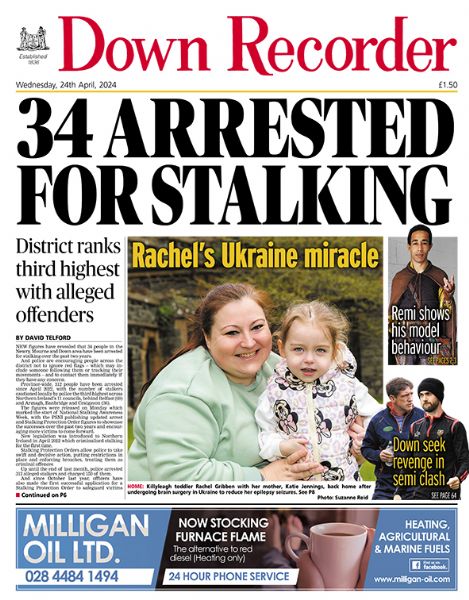A servant of Down mourned
A servant of Down mourned
3 January 2018
DR Maurice Hayes, who died on December 23 at the age of 90, was a remarkable man, who gave a lifetime of service to the people of Co Down and much further afield.
Feted by presidents and prime ministers, who appreciated his formidable intellect and innate common sense, he was at ease in the corridors of power — be they in London, Dublin, Washington or Europe. Yet he was just as comfortable walking the streets of Downpatrick, which he was proud to call his home.
He was a gifted scholar, an inspirational teacher, a committed public servant, a visionary sports administrator and a passionate believer in peace and reconciliation, plus much more.
His achievements were many. He was Town Clerk of Downpatrick, chairman of the Community Relations Commission, Assistant Secretary of the power-sharing Executive, Permanent Secretary at the Department of Health at Stormont, an Irish Senator, a member of the Patten Commission into police reform, a member of the Ireland Fund Executive and the Ombudsman for Northern Ireland.
Even if he had done none of these things his place in history would be secure as being the organisational genius behind the rise of Down Gaelic football. Before him Down was a backwater in the GAA. Thanks to his leadership, determination and drive, Down became the pre-eminent force in Ulster and Ireland, winning three All-Ireland senior football titles in the 1960s.
Dr Hayes was born in Killough in 1927, one of a family of six to Michael and Margaret Hayes. His father was a Waterford man, while his mother came from Kerry. While still a young boy the family moved to Downpatrick where his father became Town Clerk in the old Downpatrick Urban Council and his mother ran the famous Denvir’s Hotel, which was also to be the family home.
He was one of the first pupils at St Patrick’s Grammar School and continued his studies at Queen’s University, graduating with a degree in English. He returned to his old school and taught English and Irish before moving into local government and succeeding his father as Town Clerk of Downpatrick.
Away from civic affairs, he immersed himself in the GAA. He had played inter-county hurling for Down, but it was his influence off the pitch which displayed his greatness.
Appointed secretary of the Down County Board in 1956, he introduced and implemented a series of what were then seen as radical measures with the aim of bringing Down to the top.
A new all-county league structure was brought into being with the aim of identifying the best players and those players selected for Down would be nurtured and looked after as never before.
In 1959 Down had won their Ulster Championship. The following year they were All-Ireland champions and they were to retain the title the following year.
Dr Hayes left the county board to concentrate on his career as a public servant. Following the outbreak of the Troubles he was appointed chairman of the newly-created Community Relations Commission. In 1973, he was appointed Assistant Secretary of the power-sharing Executive, which collapsed following the Ulster Workers Council Strike.
His ability in both roles led to a highflying career at Stormont where he became Permanent Secretary at the Department of Health where he again showed that he was an administrator of the highest calibre.
Throughout his career in the civil service Dr Hayes won the respect and admiration of politicians from both sections of the community. He became the first Catholic to be appointed Ombudsman for Northern Ireland and later was a member of the Patten Commission into policing which replaced the RUC with the PSNI.
His nimble mind was matched by his agility with the pen. He wrote a number of books, including three memoirs: Sweet Killough, Let Go Your Anchor, Black Puddings With Slim — A Downpatrick Boyhood, and Minority Verdict — Experiences of a Catholic Civil Servant. He also wrote for a number of newspapers and was a non-executive director of Independent Newspapers.
Dr Hayes was also a devoted family man. He married his wife, Joan, in 1955 and was blessed with five children. Throughout his career his family came first and he delighted in their achievements.
Dr Hayes did not distinguish between Catholic or Protestant. To him everyone was the same and in his native Lecale he delighted in the good community relations which, he believed, provided a blueprint for the future of Northern Ireland.
He was at ease with people of all classes, creeds and backgrounds. He continued to be active well into his retirement, taking a keen interest in affairs both near and far.
Few people crammed as much into their lives. Maurice Hayes lived a good and noble life to the full.
He had the touch of greatness, tempered by equal measures of humility and humanity.
The sympathy of the community is extended to wife, Joan, children Clodagh, Margaret, Dara, Garrett and Ronan, eight grandchildren, sister Helen and the wider family circle. He was predeceased by his brother, Ray, and sisters Joan, Claire and Carmel.

